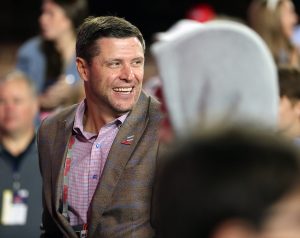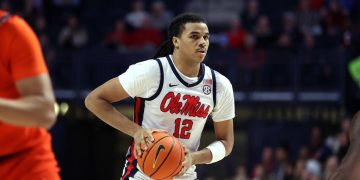
Ole Miss has become a nationally relevant sports brand under the leadership of Keith Carter, the University of Mississippi’s Vice Chancellor for Intercollegiate Athletics.
Since Carter’s appointment on Nov. 22, 2019, Ole Miss has won national championships in baseball and women’s golf, the football team has played in two New Year’s Six bowl games and Ole Miss has scored its highest finishes in the Learfield College Directors’ Cup. In the 2021-22 season alone, 16 of 18 Rebel sports teams made the NCAA tournaments.
Carter has handled all that while navigating COVID-19 lockdowns, the introduction of NIL, the formation of the Grove Collective and the complexities of the transfer portal.
Carter’s first major move as athletic director was to hire Lane Kiffin as the head coach of the football team. That move has paid off big time for Carter and Ole Miss.
Under Kiffin, Ole Miss football has completed two 10+ win seasons and competed in two NY6 bowls. Most recently, the Rebels defeated Penn State in the Chick-fil-A Peach Bowl and ended the 2023 campaign with their highest AP final ranking (No. 9) in over 50 years.
“(We) needed something that would kind of galvanize the program,” Carter said in an interview with The Daily Mississippian.“Then to hire Lane Kiffin was a good move on both sides.…Hopefully we’re just getting started.”
After the acquisition of Kiffin, Carter landed softball Head Coach Jamie Trachsel, who led the University of Minnesota to its first Women’s College World Series. Since Trachsel took the helm, the Lady Rebels have made two NCAA Regional Finals appearances and collected 12 conference wins during the 2022 season, the most in program history.
In Carter’s second year as the athletic director, 16 of 18 Rebel teams reached their respective NCAA tournaments. Ole Miss recorded its highest finish (No. 20) in the Learfield Cup standings, the highest ever for any school in Mississippi.
During that same year, the Ole Miss Baseball team won its first College World Series championship, arguably the most outstanding achievement in the history of Ole Miss sports.
“I think the consistency of our 18 sports has been good. … We’ve been able to elevate the brand of Ole Miss Athletics,” Carter said. “I think (we) have had some national prominence and relevance that’s been really cool.”
Carter’s most recent major move was hiring Chris Beard as the head coach of men’s basketball. The former NCAA coach of the year made an immediate impact on the team with a 13-0 start to the 2023-24 season.
Even though the men’s team did not qualify for the NCAA Tournament and finished the season 7-11 in conference play, Carter granted Beard a long-term contract extension.
While Carter acknowledged that people judge athletic directors on how much they win, he wants people to remember him as someone who worked hard and treated people well.
“We’re not gonna win at all costs. … We want to make sure we’re treating people the right way, building a great staff, a great culture and bringing in student-athletes that fit that culture and want to be Ole Miss Rebels,” Carter said. “I guess what I would want other people to think about me is that I worked really hard for this great institution. … I put our student-athletes first … and then ultimately that I was a good person.”
Just as much attention is now paid to an athletic director’s handling of the changing dynamics of collegiate sports as to the program’s total wins and losses.
“It’s interesting with the way NIL, the portal and the (Grove) collective are all happening at the same time,” Carter said. “It’s been a little bit of a perfect storm for change and growth and getting out of your comfort zone. (It’s) a little bit like COVID in some ways. … You’re trying to be proactive, but at the same time, you don’t want to get too far ahead of yourself.”
As was the case all over the country, COVID-19 took a toll on athletics, and it has been an uphill battle reestablishing Ole Miss as a force in sports.
“(The COVID-19 pandemic) was tough. … It felt like every day, there was new information that was happening in real-time. You were trying to make the best decisions you could with the information you had,” Carter said. “It was comforting to know that everybody was kind of fighting the same battle.”
Almost every sport for which Ole Miss fields a team has benefited from Carter’s leadership.
“We’ve got a lot left to do,” Carter said. “That’s what we talk about a lot here. We want to continue to push the envelope, be aggressive, be creative and continue to make Ole Miss a national brand.”


























